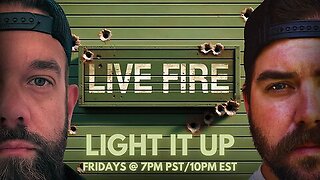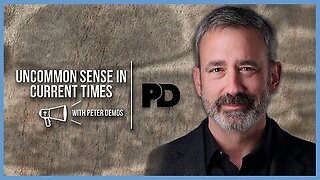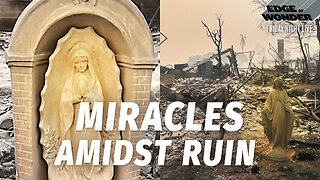Premium Only Content

Episode 2268: What is Practical Atheism? with Sharon
Psalm 52
Unto the end, for Maeleth, understandings to David. The fool said in his heart: There is no God.
They are corrupted, and become abominable in iniquities: there is none that doth good.
God looked down from heaven on the children of men: to see if there were any that did understand, or did seek God.
All have gone aside, they are become unprofitable together, there is none that doth good, no not one.
Shall not all the workers of iniquity know, who eat up my people as they eat bread?
They have not called upon God: there have they trembled for fear, where there was no fear.
For God hath scattered the bones of them that please men: they have been confounded, because God hath despised them.
Who will give out of Sion the salvation of Israel? When God shall bring back the captivity of his people, Jacob shall rejoice and Israel shall be glad.
This Psalm underscores the themes of practical atheism, noting the folly of denying God's existence, the resulting corruption, and the lack of goodness among those who live without seeking God.
Welcome back to CR and I am your host, Sharon and today we have a thought-provoking episode lined up for you. We will be exploring the concept of "Practical Atheism," a term that describes a growing trend in contemporary society, and we will be examining it through the lens of traditional Catholic teaching. What does it mean to live as a practical atheist, and how does this stand in contrast to the principles of our faith? Let us find out.
What is Practical Atheism?
Sharon: So, what exactly is practical atheism? Unlike theoretical atheism, where one explicitly denies the existence of God, practical atheism is more about living as if God does not exist, regardless of one’s professed beliefs. This can manifest in various ways: prioritizing secular values over spiritual ones, neglecting religious practices, or making decisions without reference to moral teachings derived from faith.
Practical atheism often goes unnoticed because it does not involve an outright rejection of God. Instead, it is more insidious, subtly influencing how individuals live their daily lives. People might attend church on Sundays but leave their faith at the door when making decisions about work, relationships, or even ethical dilemmas.
The Catholic Perspective
Sharon: From a traditional Catholic perspective, practical atheism poses a serious challenge. Catholicism teaches that faith is not merely a set of beliefs to be professed, but a way of life. The Catechism of the Catholic Church emphasizes that faith should permeate every aspect of a believer’s existence, influencing their actions, decisions, and interactions with others.
“In Catholic teaching, living one's faith authentically means integrating it into every part of our lives. It is not enough to just attend Mass or pray. Our faith must inform our decisions, our values, and how we treat others. Practical atheism is dangerous because it compartmentalizes faith, treating it as irrelevant to daily life.”
This viewpoint is deeply rooted in Scripture. In the Book of James, we read, "Faith without works is dead" (James 2:26). This means that genuine faith must manifest in actions. A life of practical atheism contradicts this, as it suggests that faith and daily life can be separated. I would add, therefore by their fruits you will know them (or not?) Matthew 7:20
Modern Catholicism and Cultural Influence
In our contemporary world, the Catholic Church faces unique challenges. One of the most significant is the influence of modern culture on the faith of its adherents. While the Church strives to engage with the world, there is a fine line between engaging and conforming. As with abortion…most people would say, I would never have an abortion, but it is not for me to judge those who do. Or with homosexuality…They are nice people. Who am I to judge them? Or even President trump said his position is an exception for incest or rape. Very humanistic of him. God makes no exception for the murder of any of his children.
Bishop Sheen tells a story where a woman that was raped and had the baby and was ostracized due to being a single mother, Bishop Sheen said she picked up her cross and carried it. Do not let modern secularism or feminism sway what God has commanded. This can sometimes lead to practical atheism within the Church itself. This is why we need to stick with God’s laws. They are the same yesterday, today and tomorrow. They are firm, true and not to be altered.
In the Old Testament, when God would send the Kings into battle. He would instruct them to kill the men, or to kill men, women and children and sometimes all their livestock and to take no plunder. That sounds so cruel, inhumane and unloving. Why? So that the ways of evil would be eradicated from the earth. Or, the destruction of Sodom and Gomorrah, or the flooding of the earth. Things like practical atheism are like yeast. A little bit takes over the whole batch.
Modern culture, with its emphasis on individualism, materialism, and secularism, often stands in stark contrast to Catholic values. When the Church adopts cultural trends without discernment, it risks diluting its message and values. For instance, consider the shift towards a more consumer-oriented approach in some church activities, where the focus is on attracting numbers rather than fostering deep spiritual growth. Did not Jesus say in Matthew 7 13-14, ‘Enter ye in at the strait gate; for wide is the gate and broad is the way that leadeth to destruction. And many there be which go in there; because strait is the gate and narrow is the way which leadeth unto life and few there be that find it.”
Walt: The Church must navigate the modern world without losing its essence. This means being relevant and engaging but also maintaining a prophetic stance. When the Church tries too hard to fit in with contemporary culture, it can inadvertently promote practical atheism by downplaying the need for a transformative faith that challenges the status quo.
Sharon: So Walt, I cannot keep quiet. Let’s talk about Transgender and hom. xuality. It is being shoved down our throats every day, isn’t it? It is pride month. Can we ignore it any longer? Let’s talk about that. They choose June, the month of the Sacred Heart of Jesus. First dig. They chose, Pride…What does it say in Proverbs 16:18, Pride goes before a fall. Isn’t that what got Lucifer evicted from heaven? Let us discuss the gay pride flag. Did you know that it only contains 6 of the 7 colors in a true rainbow. 6 is a number of imperfections with 7 being a perfect number. On the 6th day God created the beasts. And, in Lev 18:22 does not state, Thou shalt not lie with mankind as with womankind, it is an abomination.
Let us talk about transgender or even cross dressing which they are shoving down not only our throats but those of the innocent children in the school systems. In Deut 22:5, Moses was given laws for the Hebrews… A women shall not wear that which pertaineth unto a man, neither shall a man put on woman’s garments for all that do so are abomination unto the Lord thy God.
So, as traditional Catholics, we need to understand that it is our responsibility to uphold the teachings of God, for He is the same yesterday, today and tomorrow. We are not judging, we are educating and pleading for the conversion of souls for Christ, right? We are the voices crying in the wilderness to repent. God is the final and just Judge, is he not? We would be remiss and will be accountable for not speaking the truth.
Sharon: Another example is the way social media is used by many Catholics, including clergy. While it is a powerful tool for evangelization, it can also lead to a superficial understanding of faith. When likes and shares become more important than the substance of the message, the depth of Catholic teaching can be lost, contributing to a culture of practical atheism where faith is only skin-deep. I would add that you really need to discern what you hear. You need to investigate and research who it is you are listening to.
Real-World Implications and Reflections
Let’s consider some real-world implications of practical atheism. Imagine a business leader who identifies as Catholic but makes decisions based solely on profit, without regard to the ethical teachings of the Church. Or consider a politician who attends church but enacts policies that contradict Catholic social teachings on issues like the sanctity of life, social justice, or care for the poor.
This disconnect can erode the witness of the Church in society. When Catholics live as practical atheists, it can lead to scandal and disillusionment among believers and non-believers alike. It raises the question: How credible is our faith if it doesn’t visibly impact our lives?
I heard something interesting the other day on a podcast. It came from one of Father Rippinger’s men, Dan Sneider. He was discussing the demons. He said that demons are fallen angels…we know that. However, they were created equal to the angels in heaven who did not fall. They have the same nature. The longer the angels are out of God’s light, His presence, the more deprived and perverse they become. I would argue or suggest that does not this same thing happen to man when his focus is no longer on God. Have we not become a more depraved society? Are we not accepting things that for thousands of years were sinful but are now acceptable. All this, “Who am I to judge” that people say. Is that not putting God in a box for Sundays or Christmas and Easter? We have to stand up for the teachings of the Church and not be ashamed. We need to stand up for the principles of the church without being afraid of how it will be accepted. We must live our witness. We are to be little Christ’s on earth. We lead by example. We are strangers in a foreign land. We are to stand out as different but a different that attracts with peaceful spirit, charity and above all hope not despair.
Do we as traditional Catholics not still read from John at the end of mass. Is it perhaps why they have removed it from the Novus Ordo mass? It reads, He was in the world and the world was made by him and the world knew him not, But as many as received him, to them gave he the power to become the sons of God, even to them that believe on his name. Are we or aren’t we the sons of God. We need to ask ourselves that question. Are we willing to deny ourselves and pick up our cross and uphold the teachings of the one true apostolic Catholic Church?
Walt: One of the great challenges for the Church today is to bridge the gap between faith and life. We need to re-evangelize ourselves, recognizing that every choice we make should reflect our commitment to Christ. It is not about perfection, but about striving to live in a way that is consistent with our faith.
Conclusion
Host: In conclusion, practical atheism is a subtle yet pervasive challenge for contemporary Catholics. It calls us to reflect deeply on how our faith influences our daily lives. Are we living in a way that truly reflects our beliefs, or are we compartmentalizing our faith?
We also need to be aware of how modern culture can influence the Church and our faith practices. It is essential to engage with the world without losing the core of our Catholic identity. Let us take this as an opportunity to renew our commitment to living authentically Catholic lives, ensuring that our actions align with our professed beliefs. Thank you for joining us on this journey today. We hope this discussion has inspired you to integrate your faith more fully into your everyday life.
Practical atheism is defined as living as if God does not exist, regardless of professed beliefs, which poses a challenge to the authentic integration of faith into daily life. The discussion highlights the importance of allowing faith to permeate all aspects of existence, supported by Scripture and Church teachings, and calls for a recommitment to living authentically Catholic lives. The episode also examines how modern culture influences the Church, potentially leading to practical atheism, and encourages a balance between engaging with contemporary society and maintaining the integrity of the Catholic faith.
-
 LIVE
LIVE
I_Came_With_Fire_Podcast
12 hours agoTrump SABOTAGE, LA FIRE CHIEF SUED, and BIDEN’S LAST F-U!
361 watching -
 2:59:47
2:59:47
Joker Effect
3 hours agoUkraine in a video game? Hardest thing I have done. S.T.A.L.K.E.R.2 Heart of Chornobyl,
43K4 -
 1:15:22
1:15:22
Flyover Conservatives
23 hours agoEczema, Brain Fog, B.O., and Gas… Eating Steak and Butter Creates Ultimate Health Hack - Bella, Steak and Butter Gal | FOC Show
37.4K -
 51:58
51:58
PMG
7 hours ago $1.14 earned"Can the Government Learn from Elon Musk’s 70% Labor Cut? A Deep Dive into Inefficient Agencies"
25.7K -
 LIVE
LIVE
Amish Zaku
6 hours agoRumble Spartans #10 - New Year New Maps
175 watching -
 1:04:58
1:04:58
In The Litter Box w/ Jewels & Catturd
1 day agoNo Tax On Tips! | In the Litter Box w/ Jewels & Catturd – Ep. 722 – 1/17/2025
145K32 -
 5:35:39
5:35:39
Dr Disrespect
13 hours ago🔴LIVE - DR DISRESPECT - WARZONE - CRAZY CHALLENGES
167K33 -
 1:16:30
1:16:30
Edge of Wonder
9 hours agoLA Fire Updates: Miracles Amidst the Devastation
42K13 -
 54:54
54:54
LFA TV
13 hours agoBanning Mystery of the Ages | TRUMPET DAILY 1.17.25 7pm
35.8K7 -
 1:47:13
1:47:13
2 MIKES LIVE
6 hours ago2 MIKES LIVE #168 Open Mike Friday!
30.8K3